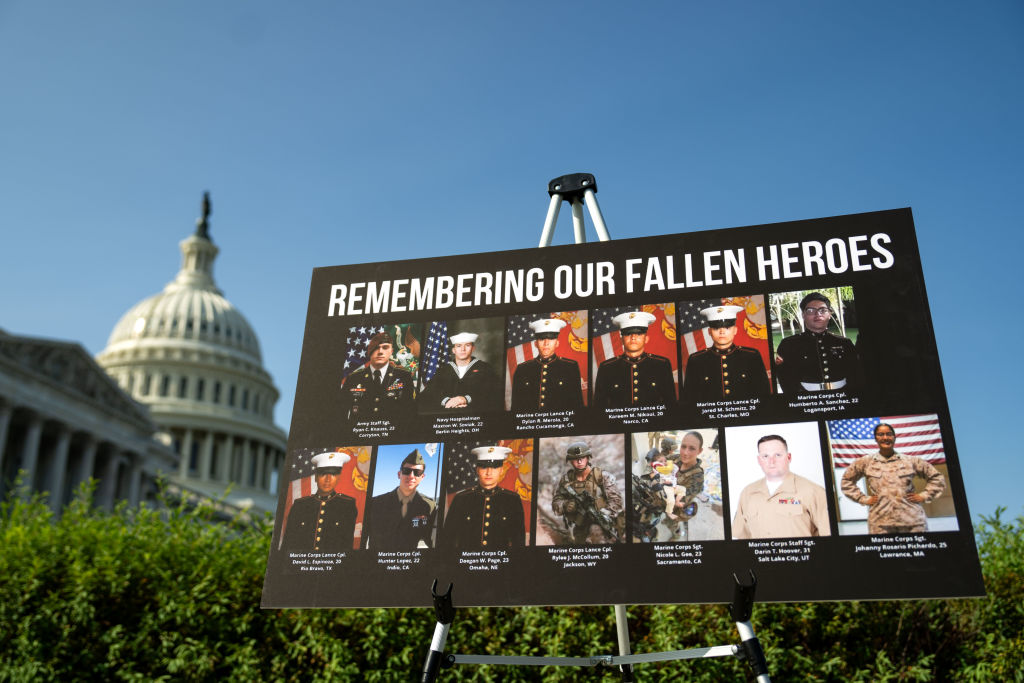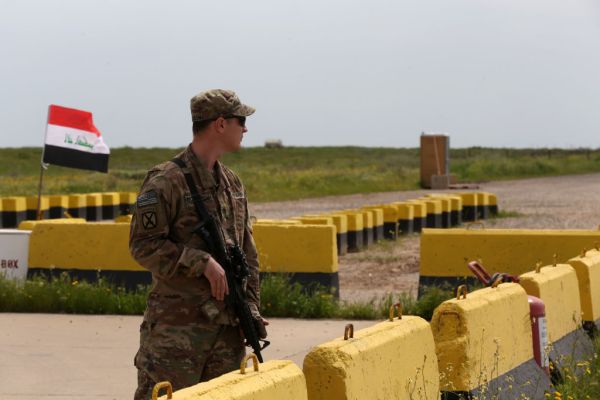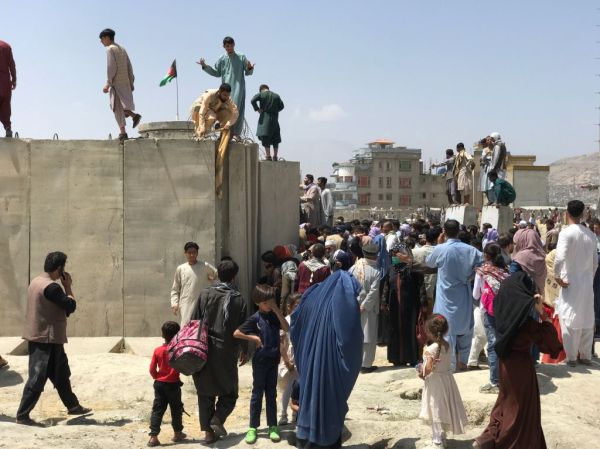Happy Tuesday! Since the first iteration of Fyre Fest was such a triumph, we’re glad to hear that organizer Billy McFarland—who did four years in federal prison for wire fraud and still owes millions of dollars to the original attendees and investors—is ready for Fyre Fest 2.0, currently slated for April 2025.
This time, McFarland said, a production company is “handling everything from soup to nuts”—with something more impressive than a cheese sandwich somewhere in the middle, we hope.
Quick Hits: Today’s Top Stories
- Vice President Kamala Harris’ presidential campaign added an issues page to its website on Sunday night, outlining a policy agenda ahead of tonight’s presidential debate. Harris has already pitched many of the listed policy prescriptions on the campaign trail, including tax cuts for middle-class families, subsidies of up to $25,000 for first-time home buyers, and a federal ban on corporate “price gouging” for food and groceries. The policy guide also features several descriptive rebukes of Project 2025, the conservative policy blueprint organized by the Heritage Foundation intended for the next Republican White House administration, though publicly disavowed by former President Donald Trump.
- Syrian officials on Monday claimed that Israeli airstrikes killed at least 18 people on Sunday night and wounded 40 others, and accused Israel of targeting civilian sites. The strikes allegedly occurred in an area thought to be home to a base for Iranian forces and Iran-backed militias, as well as sites for the manufacturing of chemical weapons. The Israel Defense Forces (IDF) has not publicly commented on the alleged aerial attack and casualties, with a spokesperson telling CNN the IDF does not issue responses “on reports in the foreign media.”
- Russian officials claimed that the country’s forces took control on Sunday of Novohrodivka—a Ukrainian town near the logistical hub of Pokrovsk. Although Ukrainian forces continue to control Pokrovsk, Russian forces have made consistent, if slow, progress in recent weeks toward the strategically important town. Nevelske and Vodiane—two small Ukrainian villages in the Donbas region—may have also fallen into Russian hands. Ukrainian officials have yet to confirm Russian control of the three Donbas sites.
- Federal prosecutors on Monday charged two people accused of running a transnational terrorism ring, Terrorgram Collective, on the social media app Telegram. According to authorities, the far-right and white supremacist network facilitated the planning and execution of hate crimes against people of color, public officials, and the LGBT community. The indictment alleges that Dallas Humber and Matthew Allison moderated the group and took credit for a shooting at a gay bar in Slovakia perpetrated by one of the group’s members. The two men were charged with 15 counts related to soliciting hate crimes, the murder of federal officials, and “conspiring to provide material support for terrorists.”
- The Biden administration on Monday finalized a rule first proposed last summer that would expand requirements mandating that mental health and substance abuse benefits provided in health insurance plans be no different from coverage of physical health benefits. Though such a requirement has been in place since the Mental Health Parity and Addiction Equity Act (MHPAEA) was passed in 2008, the proposed rules—which include implementing health plan evaluations and requiring compliance from non-federal government health plans—is an effort to increase enforcement of the MHPAEA and “close existing loopholes,” according to a White House statement. A trade group representing U.S. employers who sponsor large health plans said the new rule would increase the costs of health plans for employers and of care for enrollees.
- A wildfire in San Bernardino, California, that started on Friday continued expanding on Monday, injuring three firefighters and prompting further evacuations in the region. State authorities reported more than 1,700 firefighters are working to douse the blaze, which is currently covering more than 21,000 acres and only three percent contained. Meanwhile, another wildfire in Washoe County, Nevada, near the city of Reno spread across 6,500 acres on Monday and also necessitated evacuations across the region.
- James Earl Jones, the legendary actor who voiced Star Wars villain Darth Vader in the original trilogy and subsequent spinoffs, died on Monday at the age of 93. The star of stage and screen was one of just a handful of entertainers to complete an “EGOT”—winning an Emmy award, a Grammy, a Tony, and an Oscar, though it was honorary.
‘He’s Not Listening to Anybody’

In the early evening of August 26, 2021, a panicked crowd of roughly 2,000 Afghans surged against Abbey Gate, one of the main entrances to Kabul International Airport. They were driven mostly by blind desperation: The Taliban had taken Kabul 11 days earlier, and Abbey Gate had become the only sure way out of the country.
Personnel from the U.S. Army and Marines attempted to keep order as frantic Afghans begged to be processed by overwhelmed State Department personnel. Service members attempted to pull civilians identified by State Department inside the gate even as they engaged in “hand to hand fighting” to keep from being overwhelmed by the crowd, which “was crushing women and children up against the barricade, crushing them against it hard enough to hurt at a minimum and possibly kill people,” according to sworn statements by personnel present.
Then, at 5:36 p.m., a massive blast ripped through the area. Standing within 20 feet of U.S. troops, Abdul Rahman al-Logari—a member of the Islamic State-Khorasan (ISIS-K)—detonated an explosive vest he was wearing, killing himself and at least 181 others. Casualties included dozens of Afghan civilians and 13 of the U.S. service members present at the gate.
In sworn testimony, Gen. Kenneth F. Mackenzie, leader of U.S. and NATO forces in Afghanistan at the time of the attack, pointed the finger at the policy planners in Washington. “If there is culpability in this attack,” he said, “it lies in policy decisions that created the environment of August 2021 in Kabul.”
But who, exactly, created that environment? Republicans on the House Foreign Affairs Committee (HFAC), led by Chairman Michael McCaul, pointed the finger at the Biden administration yesterday, releasing a report summarizing their three-year investigation into the chaotic end of America’s longest war. Indeed, the disastrous operation—which had its roots in the Trump administration—remains a bludgeon for partisans on both sides of the aisle ahead of tonight’s debate.
The investigation—which was conducted without Democratic participation—began after McCaul assumed chairmanship of the HFAC in 2023, but included interviews and testimony dating back to 2021. And although the report was released on Monday, its authors are still seeking the testimony of Secretary of State Antony Blinken, who was subpoenaed last week under the threat of being held in contempt of Congress after refusing multiple requests to appear before the committee. The deadline for him to appear is September 19, though State Department officials said that Blinken was not available to testify on the dates proposed and have suggested “reasonable alternatives.”
Rep. Gregory Meeks of New York, the ranking Democrat on the committee, accused McCaul on Monday of outlining a “predetermined, partisan narrative about the Afghanistan withdrawal,” while the White House released a statement saying that the report was based on “based on cherry-picked facts, inaccurate characterizations, and pre-existing biases that have plagued this investigation from the start.”
And it wasn’t just Democrats who found themselves critical of the committee’s investigation and its final report: Jerry Dunleavy, a former journalist who served as a senior investigator on the committee, resigned “in protest” last month over what he claimed was an insufficiently thorough fact-finding mission. “While the Committee’s investigation has indeed unearthed further evidence detailing the Biden-Harris Admin’s responsibility for the horrific events of August 2021 & for the dangerous global fallout which followed, McCaul & his team have also been derelict in their duty to pursue answers for the Abbey Gate Gold Star families, to seek the proper documents, to bring in the proper witnesses, to ask the tough questions, to fully pursue the truth without fear or favor, & to do everything in the Committee’s power to ensure that a deadly humiliation like this never happens again,” he said. “McCaul & the Committee made promises to the Abbey Gate Gold Star families & to the American public at large—& those promises simply have not been kept.”
While the facts are certainly embarrassing for those involved in the withdrawal, the report—titled Willful Blindness: An Assessment of the Biden-Harris Administration’s Withdrawal from Afghanistan and the Chaos that Followed—doesn’t add many new details to the public record about the ignominious U.S. retreat. “The evidence proves President Biden’s decision to withdraw all U.S. troops was not based on the security situation, the Doha Agreement, or the advice of his senior national security advisors or our allies,” the report says, referring to the agreement former President Donald Trump negotiated with the Taliban. “Rather, it was premised on his longstanding and unyielding opinion that the United States should no longer be in Afghanistan.”
Biden announced in April 2021 that U.S. troops would be completely out of the country by September 11, the 20th anniversary of the 9/11 attacks, and the Taliban made rapid gains in the spring and summer of that year in anticipation of the withdrawal. Even as the Afghan army fell apart, Biden held firm in his decision. Speaking to Dunleavy and James Hasson for their book, Kabul, about the fall of Afghanistan, Col. Seth Krummich, former chief of staff for Special Operations Command, summed it up: “The president decided we’re gonna leave, and he’s not listening to anybody.”
But according to testimony by witnesses from the State Department, the White House believed it still had plenty of time for an orderly withdrawal. The administration had not planned for a rapid takeover of Kabul, for the Taliban to control the U.S. Embassy or Kabul International Airport, or for a collapse of the Afghan government. In fact, Biden officials apparently believed that the embassy would be able to keep operating even if the president had issued a “go-to-zero” order for the number of U.S. troops.
National Security Adviser Jake Sullivan, speaking about the rapid collapse of Afghan security forces before the Abbey Gate explosion in August 2021, argued that “when push came to shove, they decided not to step up and fight for their country.” Military analysts have pushed back on that argument, though, noting that the Afghan military was structured to rely on U.S. logistical and air support and that American officials drastically overestimated the number of Afghan troops available to fight.
According to the report, Biden also waited until after Kabul International Airport had been overrun and the city taken to order a surge of troops that secured the airfield. The president also ordered an evacuation of Bagram Air Base, a major airfield, in early July, opting not to keep enough U.S. troops stationed there to secure and utilize the facility and carry out an evacuation.
In a report issued in September 2023, the State Department’s Office of the Inspector General said officials in the State Department and U.S. Embassy in Kabul wished to avoid creating panic in the country by planning for the worst-case scenarios. But pretending problems did not exist did nothing to solve them—and ultimately exacerbated them.
As Taliban forces neared Kabul in the spring of 2021, the McCaul report describes an embassy overwhelmed by applications from Afghans seeking to leave the country. U.S. efforts to evacuate Afghans in danger from the Taliban were extremely belated, according to the report, with the first flight of evacuees only departing on July 29—barely more than two weeks before the fall of capital city. Russ Travers, a top adviser to the National Security Council, told the committee in 2021 that the Afghan special immigrant visa program was “a slow-moving train wreck.”
“We were going to fail,” he told the committee. “The question was how badly we were going to fail.”
Kabul descended into chaos in August as U.S. forces and their NATO allies scrambled to leave in some semblance of order and ensure the safety of their own citizens in the country. The report describes farcical scenes: Marines who were ordered to demilitarize the Kabul airport broke windows, flipped cars, and graffitied walls, but when U.S. military officials decided that they wanted to leave a functional airport, they were ordered to clean the airport, un-flip the cars, and paint over graffiti.
Once the U.S. had totally withdrawn and the Taliban takeover was complete, the group seized more than just a functioning airport. The Taliban took possession of billions of dollars worth of Western arms and equipment left in the country, along with up to $57 million in U.S. dollars, according to the report. The Taliban engaged in extensive reprisals against their enemies, reportedly using captured biometric data and equipment.
At the time, the American public seemed to agree with the report’s assessments of Biden’s culpability. The chaotic final days of the withdrawal from Afghanistan, with indelible images of panicked crowds and Afghans clinging to and falling from cargo planes, were the turning point for President Joe Biden’s approval ratings. More Americans approved of Biden than disapproved before the withdrawal; after the withdrawal, those numbers flipped and have never rebounded.
For his part, Biden has long sought to deflect blame onto the Trump administration. “I bear responsibility for fundamentally, all that’s happened of late,” he said shortly after the attack. “But here’s the deal: You know—I wish you’d one day say these things—you know as well as I do that the former president made a deal with the Taliban.”
And indeed, Trump was the original architect of the U.S. withdrawal from Afghanistan. His administration oversaw the negotiations with the Taliban that led to an eventual deal promising to pull all NATO troops out of the country in return for the Taliban ceasing attacks on U.S. troops, preventing Al-Qaeda from operating in the country, and pledging to engage in talks with the Afghan government, with whom the Taliban had previously refused to negotiate. The Taliban began violating this deal, known as the Doha Agreement, almost immediately—which McCaul argues should have made the deal null and void for Biden.
Former National Security Adviser John Bolton, who was present for much of the Trump administration’s debate over Afghanistan before he stepped down in 2019, said that the deal with the Taliban was ultimately Trump’s responsibility. “He wanted out,” Bolton told TMD. “Biden obviously completed the process, bumbled the operation, but it was Trump’s deal.”
Stateside, those affected by the withdrawal are still demanding answers, and three years on, the war’s turbulent final days have become a live campaign issue. Trump and his staff recently became embroiled in a controversy stemming from a ceremony at Arlington National Cemetery with Gold Star families. According to eight of the families of the American troops killed at the Abbey Gate, he was there on their invitation.
But in the course of laying wreaths at the graves, Trump campaign officials engaged in a “verbal and physical” altercation with cemetery staff, according to NPR. Arlington staffers reportedly objected to the presence of campaign photographers at the event, as federal law prohibits political activities from taking place at cemetery grounds.
Steven Cheung, the communications director for the Trump campaign, maintained that the presence of photographers had been cleared with the cemetery. “The fact is that a private photographer was permitted on the premises and for whatever reason an unnamed individual, clearly suffering from a mental health episode, decided to physically block members of President Trump’s team during a very solemn ceremony,” he said in a statement.
The Army, in a statement to Dispatch Politics, disagreed: “Participants in the August 26th ceremony and the subsequent Section 60 visit were made aware of federal laws, Army regulations and DoD policies, which clearly prohibit political activities on cemetery grounds,” the statement read. “An [Arlington National Cemetery] employee who attempted to ensure adherence to these rules was abruptly pushed aside.”
Vice President Kamala Harris weighed in, saying Trump had “disrespected sacred ground, all for the sake of a political stunt,” though some Gold Star families pushed back.
“Why did we want Trump there? It wasn’t to help his political campaign,” said Mark Schmitz, the father of deceased Marine Lance Corporal Jared Schmitz. “We wanted a leader. That explains why you and Joe didn’t get a call.”
Afghanistan will likely feature in tonight’s presidential debate. Harris once agreed with an interviewer that she was the “last person in the room” during Biden’s decision to pull out of Afghanistan, and has reiterated her support for the decision as recently as last month. “President Biden made the courageous and right decision to end America’s longest war,” she said in a statement on the three-year anniversary of the Abbey Gate blast. Little in the report, however, directly ties her to the decision-making.
Trump denies any responsibility for the disaster in Kabul. “The humiliation in Afghanistan set off the collapse of American credibility and respect all around the world,” addressing the National Guard Association two weeks ago in Michigan. He also claimed that the withdrawal would have gone much more smoothly on his watch.
Bolton was skeptical of Trump’s claims. “He doesn’t have any idea what he’s talking about,” Bolton told TMD. “That’s just a typical statement. You can’t prove it. You can’t disprove it. Just ‘I would have done it better.’ Well, maybe. Maybe not.”
Outside of the churn of American electoral politics, Afghanistan under Taliban rule has reverted to Islamic theocracy, state-enforced gender segregation, and crippling poverty. Al-Qaeda has also re-established a presence in flagrant violation of the Taliban’s Doha assurances. “Joe Biden may believe he finally ended the ‘forever war’ the jihadists started more than two decades ago,” The Dispatch editors wrote in our second-ever editorial after the fall of Kabul. “He’s mistaken. The jihadists are still fighting. And their victory in Afghanistan—where he chose defeat on our behalf—won’t be their last.”
Worth Your Time
- What drives people out to U.S. Route 127 every August? Stuff. “‘The World’s Longest Yard Sale’ was founded in 1987, two years into Ronald Reagan’s second Presidential term, and currently runs for six hundred and ninety miles, from Addison, Michigan, to Gadsden, Alabama,” Paige Williams wrote in the New Yorker. For some, the value of yard sale discoveries can be greater than its practical utility. “When Donna Gaddis, a retired transportation director for a public-school system, sees a tableful of rusted tools, she wonders whose hands they have touched, and what they have built. ‘You think about how many times an object has produced an economy around itself,’ Gaddis told me. ‘I like being in the food chain. I nibble on something, something nibbles on me.’ Viewed in this light, the 127 is a compendium of the American experience, not merely a repository of pet cages and cowboy boots and boxes of really bad books,” Williams wrote. “Venders may endlessly truck a piece back and forth to the 127 rather than throw it away.”
- Consumers and voters are no strangers to the economic consequences of inflation—but what about the psychological ones? “Milton Friedman famously described inflation as being ‘always and everywhere a monetary phenomenon,’” Eric Boehm wrote for Reason magazine. “That’s still true. … But it does not fully capture the effects of inflation. … Inflation, it turns out, is also a psychological phenomenon. It makes us angry. It makes us irrational. In any democratic system, that anger and irrationality can be quickly translated into poor policies—unless elected and unelected officials are prepared to withstand it, and to recognize that combating inflation often requires unpopular actions. Now is not the time to indulge the wisdom of the mob. In short, inflation breaks our brains. It makes us poorer, and poorer citizens too.”
Presented Without Comment
The Hill: Texas Democrat Smokes Blunt, Bong in Pro-Weed Campaign Ad
Also Presented Without Comment
ABC News: New Hampshire Gov. Chris Sununu Saves Choking Man In Lobster Roll Eating Competition
Also Also Presented Without Comment
Billboard: Elton John Thought It Was ‘Hilarious’ When Donald Trump Called North Korea’s Kim Jong Un ‘Little Rocket Man’
In the Zeitgeist
James Earl Jones, one of the most iconic voices in film, passed away on Monday at the age of 93. Most famous for his terrifying baritone as Darth Vader in Star Wars, the versatile, award-winning actor lent his voice to the big screen, the silver screen, the Great White Way, an animated lion, a series of cable news commercials, and a Michigan football hype video.
The American film industry has rolled by like an army of steamrollers. It’s been erased like a blackboard, rebuilt, and erased again. But the voice of James Earl Jones has marked the time.
Toeing the Company Line
- It’s Tuesday—and there’s a presidential debate—so members should keep an eye out for an email later today with information about how to tune in to a special edition of Dispatch Live (🔒)! We’ll see you … whenever the debate ends.
- In the newsletters: Kevin explored (🔒) what’s left of the GOP as traditional conservatism evaporates away, the Dispatch Politics team reported on the Republican Jewish Coalition’s efforts to cast the GOP as the “only pro-Israel party,” and Nick elucidated (🔒) the principles behind former Rep. Liz Cheney’s decision to endorse Sen. Ted Cruz’s Democratic challenger—and why he’s voting for Rep. Colin Allred, too.
- On the podcasts: Sarah and David discussed the legal questions raised by the school shooting in Georgia last week, including parental responsibility and the limits of legal liability, on Advisory Opinions.
- On the site: Charlotte reports from Tel Aviv on Israeli Prime Minister Benjamin Netanyahu’s precarious political position, Chris previews tonight’s debate, and Kevin weighs in on Trump’s recent talk of convening military tribunals.
Let Us Know
Do you approve or disapprove of the United States’ withdrawal from Afghanistan? If you disapprove, how do you apportion blame between the Trump and Biden administrations?









Please note that we at The Dispatch hold ourselves, our work, and our commenters to a higher standard than other places on the internet. We welcome comments that foster genuine debate or discussion—including comments critical of us or our work—but responses that include ad hominem attacks on fellow Dispatch members or are intended to stoke fear and anger may be moderated.
With your membership, you only have the ability to comment on The Morning Dispatch articles. Consider upgrading to join the conversation everywhere.